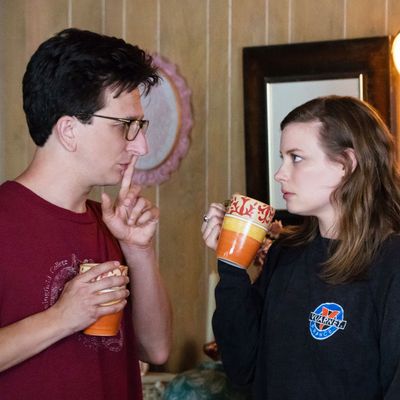
In its third and final season, Love seems to have run out of things to say … at first. In case the ellipses didn’t make it obvious, the key words in that sentence are at first.
When we initially reconnect with L.A.-based protagonists Gus (Love co-creator Paul Rust) and Mickey (Gillian Jacobs), they are happily in love and seem to have overcome the doubts and demons that gave the first two seasons a will-they-or-won’t-they-make-it flavor. Mickey, an addict when it comes to alcohol as well as sex and love, is sober and relating to Gus in a healthy way. Gus, an eager-to-please type with a tendency to say exactly the wrong thing, seems to have figured out how to be a strong, considerate partner while chasing his own dreams.
The first handful of episodes, streaming now on Netflix, explore conflicts that involve the two characters, but those are primarily rooted within their respective workplaces — Gus still can’t get respect on the set of the teen series Witchita, where he tutors its star, Arya Hopkins (Iris Apatow), while Mickey, a radio producer, continues to clash with pompous on-air therapist Greg Colter (Brett Gelman). On the romance front, though, things are pretty solid. When the main characters in a show called Love have successfully found love, what’s left to do, really?
A lot, as it turns out, something that becomes clearer in the second half of this 12-episode season when Gus and Mickey attend a wedding and, later, go back to Gus’s South Dakota hometown, where Mickey meets his family. It’s not uncommon for a season of television to improve as it progresses. But it’s rare for one to do what Love does here in its third act, which is to upend our understanding of the dynamic between the two leads and, given that this is the last season, the entire series. What has always seemed like another low-key, reasonably enjoyable Silver Lake sad-com about a messed-up woman who gets involved with a flawed but decent guy becomes a lesson in how easily we make assumptions about what the truth is and who our significant others really are.
There are other worthwhile moments along the way to that end point. The first episode — about a trip to Palm Springs that is supposed to involve luxury accommodations but definitely does not — works perfectly as an amusing, stand-alone escalating comedy of errors, but also, in retrospect, as a bookend to the season’s concluding points about dishonesty. The fifth episode focuses, happily, on the most genuinely charming person on the series, Mickey’s Australian roommate Bertie (Claudia O’Doherty), who spends her birthday getting to know someone new while still trapped in a relationship with her sweet schlub of a boyfriend, Randy (Mike Mitchell). The half-hour installments each engage with different themes — coping with humiliation, the fragility of the male ego — but do so without shouting out loud about what the subtext is.
As in previous seasons of Love, the directors tapped to handle season three — including, among others, Michael Showalter, Lynn Shelton, and series co-creator Judd Apatow — all display their well-established understanding of the rhythms of character-driven comedy. The performances from Jacobs and Rust, as well as the rest of the cast, are all so natural that it never feels like anyone is acting. Love regularly gets uncomfortable — the men on this show, especially, are so socially awkward and often inappropriate that it’s tough to get through an entire episode without succumbing to a full-body cringe — and yet, it’s still a pretty breezy show to watch.
Still, I can’t say I’m entirely sad to see Love go, mainly because calling it quits at the end of season three feels like the right move from a storytelling point of view. It also seems like part of a larger trend for the so-called “sad in California” shows. Casual and You’re the Worst — whose characters could theoretically turn a corner and bump right into Gus or Mickey — will unveil their final seasons later this year. Transparent isn’t ending, but will probably feel like a slightly different show with Jeffrey Tambor out of the cast. Love’s demise is just the first in a series of good-byes for this micro-genre.
To its credit, Love manages to close on its own terms, on an unconventionally hopeful note. But it also provides something that most of us seek but don’t often find from our television shows: a couple of genuine surprises we didn’t see coming.





